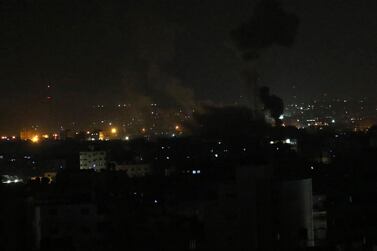Israeli tanks shelled Hamas positions in the Gaza Strip overnight in response to continued waves of incendiary balloons across the border, the army said on Thursday.
The continuing cross-border violence came despite the attempts of Egyptian security to end the flare-up, which has seen two weeks of rocket and fire balloon attacks from Gaza and almost nightly Israeli reprisals.
"Explosive and arson balloons were launched from the Gaza Strip into Israel," the Israeli army said.
"In response... tanks targeted military posts belonging to the Hamas terrorist organisation in the Gaza Strip."
Gaza security officials said the fire hit Hamas observation posts near Al Maghazi and Al Bureij refugee camps in the centre of the strip, and the town of Khan Younis, further south.
There were no casualties, they said.
Israel and Hamas, which rules Gaza, have fought three wars since 2008.
In response to the waves of balloons, Israel has banned fishing off Gaza's coast and closed the Kerem Shalom goods crossing, cutting off deliveries of fuel to the territory's sole power plant.
Power had already been in short supply even before the shutdown, with consumers having access to electricity for only about eight hours a day.
That will now be cut to just four hours a day using power supplied from the Israeli grid.






